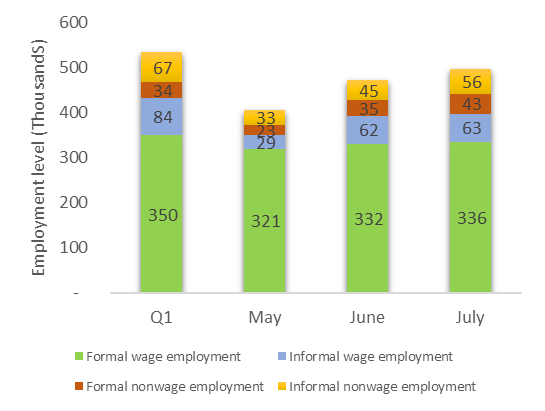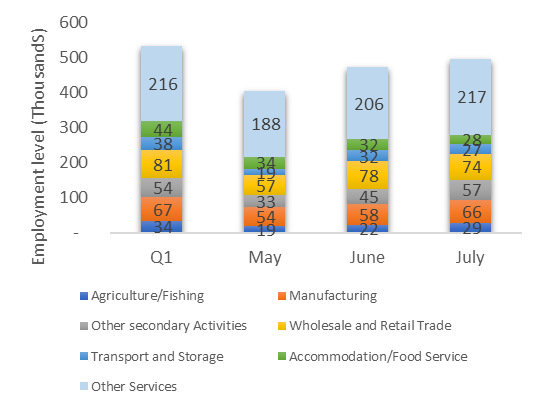In addition to an immense health and human cost, COVID-19 (coronavirus) has brought about a severe economic downturn that has taken a toll on the living standards of millions of people worldwide, particularly on the most vulnerable. One of the key transmission channels of the negative effects of the pandemic on living standards is the labor market.
In addition to a unprecedented degree of uncertainty, private sector firms have faced a triple shock. First, on the supply side, lockdowns and restrictions to individual mobility have resulted in the shutdown of many businesses and limited access to labor and other inputs. Second, on the demand side, declining incomes have reduced consumption to the essential basic needs. Third, a financial shock has severely hit a number of firms that have not been supported by banks or have not benefited from government assistance. Limited mobility and unavailability of home-based work, especially for low-skill workers performing tasks that cannot be executed remotely, associated with a plummeting labor demand translates into job losses, reduced earnings, and eventually lower living standards.
Statistics Mauritius, the country’s national statistical agency, and the World Bank have launched a series of three high-frequency telephone household surveys to monitor the effects of COVID-19 on the socioeconomic conditions of Mauritian households over the period May-July 2020. The financing for data collection and technical assistance in support of the surveys is provided by the World Bank.
The surveys capture key information at the national level about access to basic goods and services, food insecurity, changes in household income, shocks and coping strategies, and economic activity of all household members aged 16 to 64 years not in full-time education either through self-report or by proxy. The number of households covered in May, June and July was 924, 907 and 803 respectively, with an average response rate of about 74%. Sex distribution of respondents was close to parity.
Four Stylized Facts about the Labor Market Impact of the COVID-19 Pandemic in Mauritius
Stylized Fact 1. As of July 2020, employment remains below the level observed in the first quarter of the year by 36,800 units or 6.9%. As the national lockdown was lifted in June, individuals who could not work remotely have gradually returned to their workplace. This is reflected in the increase in employment levels in June and July compared with May, when the country was in complete lockdown (Figure 1).
Figure 1. Trends in employment overall and by sex, Q1 - July, 2020

Stylized Fact 2. The drop in employment levels is mostly ascribable to informal employment. During the lockdown in May, informal wage and informal non-wage employment took a hit, with a decline of 65% and 51% compared with Q1 respectively. With the lifting of the lockdown, informal employment rebounded to be around 21% below the level observed in the first quarter. On the other hand, formal employment decreased by about 10% in May and, as of July, it is 1.4% below the level observed in the first quarter.
Figure 2. Trends in employment by type and formality status, Q1 - July, 2020

Stylized Fact 3. Employment levels have declined sizably in the services sector and in agriculture. Employment in the service sector is today about 9% below the level of the first quarter, with accommodation/food services (-36%) and transport/storage (-30%) activities being the sectors most severely hit. Although agriculture posted a decline of 16%, its small relative size, at 6% of total employment before the pandemic, mitigates the impact of the sector on total employment. By contrast, employment in the secondary sector fully recovered thanks to the rebound in utilities and construction activities.
Figure 3. Trends in employment by sector, Q1 - July, 2020

Stylized Fact 4. With a decline in the number of jobs almost gender neutral, women have largely exited the labor market, while men have continued to look for jobs (Figure 4). Between Q1 and July, employment decreased by about 7% among men and by 6.5% among women (changes in levels are obviously much larger among men given their higher initial employment level). The activity rate among women declined by 2.7 percentage points from 61% to 58.3%, quickly eroding much of the progress made over the past decade. Women’s unemployment rate modestly increased by about 1 percentage point from 9.9% to 11.1%. By contrast, the unemployment rate among men almost doubled from 5.2% to 9.8%.
Figure 4. Trends in unemployment and activity rates by sex, Q1 - July, 2020
| a. Unemployment rate | b. Activity rate |
 |
 |
Technical Annex
The employed population consists of Mauritians ages 16-64 not in full time education who have worked for pay, profit or family gain for at least one hour during the third week of the survey month. It includes individuals who are temporarily absent from work for reasons such as working time arrangements, nature of their work, public holidays, annual leave, sick leave, maternity/paternity leave.
Individuals absent for other reasons, such as parental leave, education leave, other personal leave, furlough, layoff, temporary disorganization or suspension of work, lack of clients, capital or materials, strike, government lockdown, quarantine, disaster, etc., are classified as employed if one of the following two conditions hold:
- total expected duration of absence is three months or less,
- a worker continues to receive a remuneration (full or partial) paid by the employer.



Join the Conversation